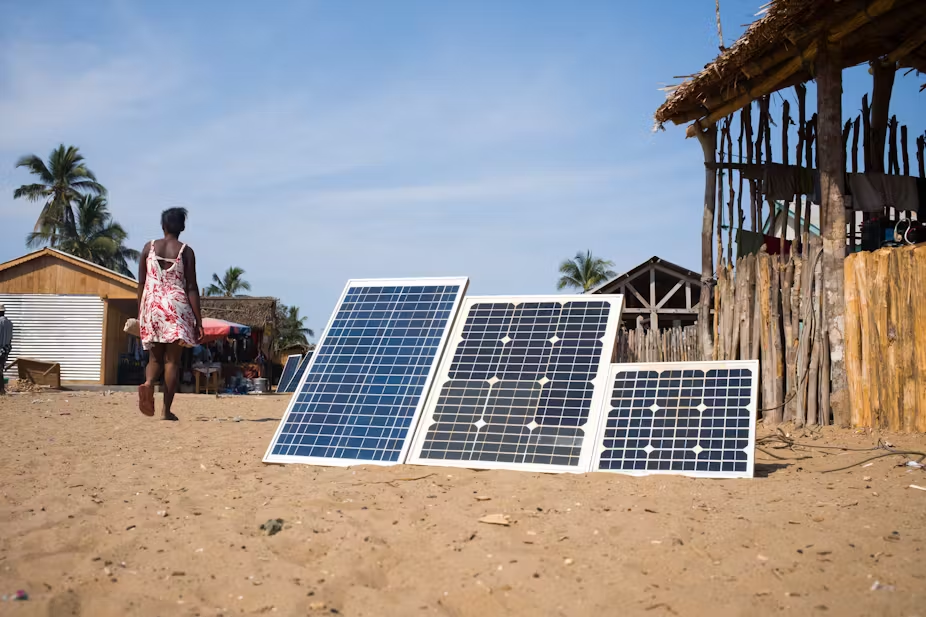Nigeria, Africa’s most populous nation, faces a profound energy paradox: immense, untapped renewable energy potential coexists with a severe and pervasive electricity deficit. Approximately 90 million Nigerians – 40% of the population – lack access to electricity.
Nigeria has long struggled with epileptic electricity supply, a challenge that impacts businesses, households, and the overall economy. It is estimated that the economy loses $26 billion annually. This chronic energy poverty, exacerbated by an over-reliance on inefficient fossil fuels and an outdated national grid, impedes socio-economic development, public health, and environmental sustainability.

Nigeria has a natural advantage because of its geographical location. It is blessed with an abundance of solar irradiation, which makes it a prime candidate for harnessing solar energy. Located near the equator, Nigeria receives high levels of solar radiation throughout the year, with an average solar intensity of about 5.5 kWh per square meter per day. In the northern regions, rises even higher, exceeding 7 kWh per square meter per day.
Nigeria urgently needs to scale up investment and support for solar energy due to a combination of economic, environmental, and social factors. The recent unveiling of the National Integrated Electricity Policy (NIEP) signals a recognition by the government to fix this crisis.
Here are reasons, why Nigeria should not only diversify its energy sources but make renewable energy sources, especially solar energy the centerpiece of its NIEP:
1. Persistent Electricity Shortages
Nigeria’s grid capacity is insufficient. It supplies only about 4,000-5,000 MW for a population exceeding 220 million. Nigeria’s estimated electricity demand stands around 160,000 MW to meet power needs. Currently, a huge gap exists between the installed capacity and actual available electricity in its erratic power grid. As a result, many businesses and households rely on expensive and polluting diesel and petrol generators. Scaling up solar energy can provide decentralized and reliable power, particularly for small and medium sized businesses, as well as rural and underserved areas.

2. High Cost of Fossil Fuel Dependence
Dependence on fossil energy impacts Nigeria in a variety of ways. The Nigerian economy remains highly susceptible to the volatility of global crude oil prices. This volatility impacts government revenue, foreign exchange reserves, and the overall stability of the economy.
Despite being oil-rich, until recently, Nigeria spent billions annually on fuel subsidies and diesel imports. For example, in 2022, fuel subsidies cost over ₦4 trillion ($10 billion). Fuel subsidies, while intended to lessen hardship, imposed a significant budgetary burden, enabled smuggling and corruption, and diverted resources that could have otherwise been invested in critical sectors like education, healthcare, and infrastructure.
The government of President Bola Ahmed Tinubu abruptly removed the fuel subsidy while delivering his presidential inauguration speech on May 29, 2023.
The removal of the subsidies unleashed a swath of punishing economic conditions on most Nigerians such as soaring petrol prices, rising cost of transportation and other goods and services, etc. This situation has exacerbated inflation and reduced the purchasing power of most Nigerian households. The government sees this policy as initial step in the transformation of the economy with a view to freeing up government funds for critical infrastructure development and vital sectors such as education and healthcare.

3. Job Creation and Green Industrialization
Nigeria’s energy industry has long been dominated by the fossil energy industry. Investing in the renewable energy industry (especially solar energy) will open the possibility for creating thousands of jobs in the energy industry. The creation of jobs in Nigeria’s solar energy industry can serve as a crucial catalyst for diversifying Nigeria’s development trajectory and nudging it away from fossil energy powered development path travelled by the west. To meet the challenges posed by the climate crisis, the path of fossil industrialization is both undesirable and unsustainable.
For developing countries like Nigeria, fossil energy will remain an essential part of its energy strategy. However, the time for gradually transitioning away from a fossil energy-centred economy has come. Growing the solar energy industry can set Nigeria on the clean and climate-friendly path to green industrialization.
This clean form of industrialization requires growing specialized skills that will help propel the development of technical and vocational training programs in renewable energy technologies to equip Nigeria’s teaming young population with relevant, future-proof skills. This upskilling of Nigeria’s workforce is fundamental to building a sustainable green economy.
The solar energy industry can directly and indirectly create jobs from the top to the bottom of the value chain in Nigeria from the manufacturing and assembling of solar products to installation, maintenance, and distribution. Jobs in the industry will encompasses technical roles like solar engineers and technicians, business-oriented roles in sales, marketing, and project management.
Furthermore, the growth of the solar industry will spur demand for related services and products that can lead to the creation of jobs in sectors such as finance (for green projects), logistics, research and development, and eventually grow the domain of the circular economy for recycling and reusing decommissioned materials from solar energy products.
Ultimately, a vibrant solar job market will indicate to climate action-minded foreign investors that Nigeria is serious about its commitment to climate action. This can attract foreign direct investment (FDI) into the renewable energy sector, to help consolidate development in green industrialization.
4. Energy Access for Rural Communities
Nigeria’s energy industry has long been dominated by the fossil energy industry. Investing in the renewable energy industry (especially solar energy) will open the possibility for creating thousands of jobs in the energy industry. The creation of jobs in Nigeria’s solar energy industry can serve as a crucial catalyst for diversifying Nigeria’s development trajectory and nudging it away from fossil energy powered development path travelled by the west. To meet the challenges posed by the climate crisis, the path of fossil industrialization is both undesirable and unsustainable.
For developing countries like Nigeria, fossil energy will remain an essential part of its energy strategy. However, the time for gradually transitioning away from a fossil energy-centred economy has come. Growing the solar energy industry can set Nigeria on the clean and climate-friendly path to green industrialization.
This clean form of industrialization requires growing specialized skills that will help propel the development of technical and vocational training programs in renewable energy technologies to equip Nigeria’s teaming young population with relevant, future-proof skills. This upskilling of Nigeria’s workforce is fundamental to building a sustainable green economy.

Most Nigerians living in rural areas lack access to electricity. Nigeria’s existing national grid, largely powered by gas-fired plants, doesn’t reach many rural areas. Expanding this grid to every remote village is economically challenging for the Nigerian government due to the massive capital investment required for transmission and distribution lines.
Rural communities with some grid connection, experience frequent blackouts and erratic power supply. These communities rely on expensive and polluting diesel or petrol generators as a backup, or kerosene and firewood which are major sources of indoor air pollution. Solar not only improves indoor air quality, it is purely and simply environmentally friendly, especially for a country that has suffered the scourge of environmental damage and remains endangered by the threats of the climate crisis.
Solar energy offers an abundance of opportunities for addressing energy poverty for Nigerians in rural communities. Its decentralized nature helps bypass the constraints of a centralized, fossil-fuel-dependent grid. The long-term cost benefits, the environmental and health improvements, and the potential for local economic growth that solar energy brings makes it a superior and more sustainable pathway to accessing reliable energy for Nigeria’s underserved rural communities than fossil energy.

In recent years, the Nigerian government along with its international partners, has embarked on programs to solarize rural areas through Solar Home Systems (SHS) and mini-grids.
The Rural Electrification Agency (REA) of Nigeria has been instrumental in promoting solar mini-grids. The Bakin Ciyawa and Kwande communities in Plateau State recently benefited from a 550kWp solar hybrid mini-grid project, providing them with their first-ever access to electricity. This initiative, part of the Interconnected Mini-Grid Accelerated Scheme (IMAS), is a partnership between the Plateau State government and the Rural Electrification Agency (REA).
The project aims to deliver clean, sustainable energy to over 3,500 households and businesses in the two communities. The project is expected to eliminate an estimated 600 tons of carbon dioxide emissions annually by using clean energy infrastructure. Indeed, solarizing Nigeria places on the path of climate mitigation.
5. Climate Change Mitigation
Climate change stands as an existential threat, not just to humanity, but to the biosphere. The deleterious effects of climate change are unequally distributed between world regions, countries and social groups within countries. Countries in the global south are being hit the hardest and soonest even though they bear the least responsibility for the climate crisis.
Nigeria is listed as one of the many climate-vulnerable countries by the UN. Nigeria faces increasing climate risks, including flooding, desertification, irregular rainfall patterns, rising temperatures, sweltering heat, etc. The World Meteorological Organization reported in 2023 that the climate crisis is worsening food insecurity, displacing populations, and diminishing agricultural productivity in Africa.

Solar energy uptake is an unavoidable part of a solution for mitigating the deleterious impact of the climate crisis in Africa. Given Nigeria’s numerical strength and clout in Africa, it must play a role in leading the mitigation project from Africa.
At COP26 in Glasgow, Scotland 2021, Nigeria committed to achieving net-zero emissions by 2060 and has composed an Energy Transition Plan (ETP) to achieve this. Increasing solar energy uptake is a core component of this plan and is crucial for meeting the UN’s Sustainable Development Goal 7 (Affordable and Clean Energy).
The combination of several government initiatives and private sector investments in large-scale solar energy projects such as solar farms, contribute to Nigeria’s Nationally Determined Contributions (NDCs) under the Paris Agreement. The Nigerian Electricity Regulatory Commission (NERC) aims to add 5,000 MW of renewable energy by 2030, chiefly through solar energy.
Deploying solar energy in large scale, offers Nigeria the opportunity to demonstrate its commitment to global climate action and lead in Africa’s sustainable energy development and the attainment of Africa’s energy sovereignty. Growing Nigeria’s solar energy capacity will boost its standing as a formidable international actor on the side of climate action despite its status as a petrostate.

